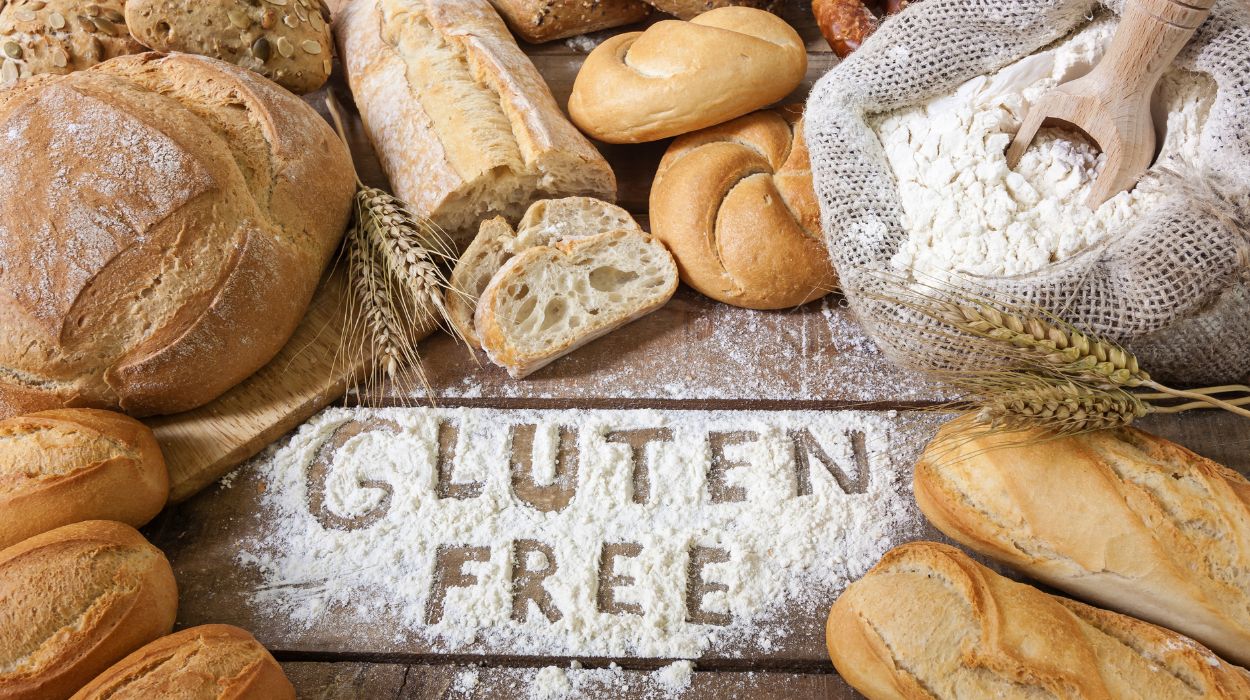 Expert's opinion
Expert's opinion
Expert's opinion
The article is a subjective view on this topic written by writers specializing in medical writing.
It may reflect on a personal journey surrounding struggles with an illness or medical condition, involve product comparisons, diet considerations, or other health-related opinions.
Although the view is entirely that of the writer, it is based on academic experiences and scientific research they have conducted; it is fact-checked by a team of degreed medical experts, and validated by sources attached to the article.
The numbers in parenthesis (1,2,3) will take you to clickable links to related scientific papers.
Gluten-Free Diet Weight Loss: Expert Guide In 2024

Gluten is a protein found in wheat, barley, and rye grains. It gives bread products their characteristic chewy texture and elasticity, making it a common ingredient in our daily diets.
For many, the gluten-free lifestyle isn’t a choice but a necessity for their health and well-being. Certain medical reasons, like celiac disease or gluten sensitivity, require a strict gluten-free diet for optimum health.
On the other hand, diets for weight loss often focus on controlling calorie intake and improving the quality of the foods consumed. To link this to gluten, when you adopt a gluten-free diet, you naturally focus on fresher, whole foods like fruits, vegetables, lean proteins, and legumes.
Here, we’ll discuss losing weight on a gluten-free diet and the benefits of embracing this dietary change.
Key Takeaways
- A gluten-free diet is not specifically designed as a weight loss strategy. Its effectiveness for weight loss is not guaranteed.
- Weight loss on a gluten-free diet can be attributed to healthier food choices, portion control, and mindful eating.
- To lose weight effectively, focus on consuming nutritious foods, maintaining a calorie deficit, and staying physically active.
- Nutrient-dense, minimally processed foods like fruits, vegetables, lean proteins, and gluten-free grains can support weight management and overall health.
What Is A Gluten-Free Diet?
A gluten-free diet[1] is an eating plan that excludes foods containing gluten. As we said above, Gluten[2] is a protein found in wheat, barley, and rye. It is composed of two proteins, gliadin, and glutenin, which give elasticity to dough and help it rise. A gluten-free diet is essential to manage symptoms of celiac disease and other medical conditions associated with gluten ingestion.
In these cases, consuming gluten can lead to various symptoms and damage the small intestine. Common gluten-containing foods that should be avoided on a gluten-free diet include bread, pasta, cereals, baked goods, beer, and certain sauces.
Meanwhile, a gluten-free diet means eating only whole foods that don’t contain gluten, such as fruits, vegetables, meat, and eggs, as well as processed gluten-free foods like gluten-free bread or pasta. Some of the claimed benefits of the diet[3] include:
- Improved health.
- Weight loss.
- Increased energy.
Who Should Be On A Gluten-Free Diet?
Generally, a gluten-free diet is recommended for individuals with specific medical conditions. Some of them include:
- Celiac disease: People diagnosed with celiac disease[4] must follow a strict gluten-free diet for life. Celiac disease is an autoimmune disorder[5] in which the ingestion of gluten triggers an immune response that damages the small intestine. Currently, the only treatment for celiac disease is complete avoidance of gluten.
- Non-celiac gluten sensitivity: Some individuals experience symptoms similar to those of celiac disease[6] when they consume gluten but do not have the same antibodies or intestinal damage. This condition is known as non-celiac gluten sensitivity.[7] These individuals may choose to follow a gluten-free diet to manage their symptoms.
- Wheat allergy: If you are allergic to wheat proteins,[8] avoid wheat and gluten-containing grains to prevent allergic reactions.
Can A Gluten-Free Diet Help You Lose Weight?

A gluten-free diet is not specifically designed as a weight loss strategy. So, its effectiveness for weight loss[9] is not guaranteed. While some individuals may experience weight loss on a gluten-free diet, it is not solely due to the absence of gluten. Research shows there is no evidence for a weight loss effect[10] of limiting gluten in the diet, but there are risks of nutritional deficiencies.
You can be gluten-free and lose weight due to an increased focus on consuming whole, unprocessed foods, such as fruits, vegetables, lean proteins, and legumes. Additionally, avoiding gluten-containing foods might reduce the intake of added sugars and simple carbohydrates — contributing to weight loss and improved health.
On the other hand, why is gluten bad for weight loss? Usually, the key factor in losing weight is maintaining a calorie deficit. It is more than only eliminating gluten. So, not all gluten-free products are inherently healthy or low in calories. Replacing gluten-containing foods with their gluten-free counterparts can sometimes increase calorie consumption and make losing weight with a gluten-free diet more difficult.
Furthermore, replacing gluten-containing grains with gluten-free grains exposes one to different processing methods and various nutrient delivery methods, which may not be as favorable. For example, the glycemic index[11] and glycemic load increased in diets that eliminated gluten. There is also a higher intake of saturated fats and hydrogenated fats which increase the risk of heart disease.
To sum up, here are a few factors to consider for a gluten diet for weight loss:
Caloric Intake
When starting a gluten-free diet, people often eliminate certain processed foods that contain gluten, such as pastries, cookies, and cakes. These foods are generally high in calories, and by removing them from the diet, individuals may naturally reduce their calorie intake, leading to weight loss.
On the other hand, the diet tends to be higher in saturated fat, which leads to weight gain. Except for crackers, gluten-free foods have more saturated fat, calories, and sugar than diets containing gluten.
Healthier Food Choices
Adopting free gluten may encourage individuals to consume whole, unprocessed foods such as fruits, vegetables, lean proteins, and gluten-free grains like quinoa or rice. These nutrient-dense foods can support weight management and overall health. So pay attention to these foods for your gluten-free food delivery. But stay away from gluten-free snack foods!
Portion Control And Mindful Eating
Paying closer attention to food choices and being mindful of portion sizes can contribute to weight loss. Some individuals find that a gluten-free diet prompts them to be more conscious of their eating habits, leading to better portion control and reduced calorie consumption.
Gluten-Free Substitutes
While many gluten-free alternatives are available, such as bread, pasta, and baked goods, it’s important to note that these substitutes may not necessarily be healthier or lower in calories than their gluten-containing counterparts. Gluten-free products often contain additional fats, sugars, or additives to enhance their taste and texture and can increase your risk for weight gain or heart disease.
Gluten-Free Foods That Support Weight Loss
Can you lose weight on a gluten-free diet? When we look closer, most gluten-free foods support weight loss. Free gluten foods that help weight loss typically include whole, nutrient-dense, and minimally processed items. Here are some examples of such foods:
- Fruits and vegetables: Fruits and vegetables[12] are essential to a balanced diet, providing various nutrients and being naturally gluten-free. They are also low in calories — supporting weight loss.
- Lean proteins: Meat, poultry, fish, and seafood are excellent gluten-free protein sources that help you feel full and satiated with fewer calories.[13] You can also use gluten-free protein powders.
- Healthy fats: Healthy fats are popular with weight management.[14] But what is gluten-free about them? Avocados, nuts, seeds, and olive oil contain no gluten. Instead, they have healthy fats that promote satiety and are naturally gluten-free.
- Whole grains: Whole grains such as quinoa, brown rice, millet, buckwheat, and amaranth are nutrient-dense sources of carbohydrates[15] that provide fiber and keep you feeling full.
- Supplements: Some supplements are useful for gluten and weight loss. An example is vitamin B supplements. Vitamin B is recommended for people sensitive to gluten and also for weight loss. Another helpful supplement is probiotics. They are gluten-free, and specific probiotic bacterial strains[16] are recommended for weight loss.
Strategies To Help Lose Weight With The Gluten-Free Diet
A gluten-free diet is one step of the way. To lose weight effectively while following a gluten-free diet, focus on consuming nutritious foods and maintaining a calorie deficit. You can try these strategies in a 7-day gluten-free weight loss diet:
- Emphasize whole foods: Focus on naturally gluten-free whole foods like fruits, vegetables, lean proteins, and healthy fats. Also, try a gluten-free fat burner to increase your rate of weight loss.
- Portion control: Overeating can hinder weight loss even when consuming healthy gluten-free foods. Monitor portion sizes and avoid huge servings.
- Stay physically active: Regularly exercise to burn additional calories, help lose belly fat, boost metabolism, and improve overall health. Combine cardiovascular activities with strength training for optimal results.
- Stay hydrated: Drinking water can help you lose weight by keeping you full and boosting your metabolism. Aim to drink at least 11.5 -15.5 cups of water per day.

The Bottom Line
Losing weight on gluten-free diets is achievable by focusing on whole, nutrient-dense foods and maintaining a calorie deficit. Combine a well-balanced, gluten-free diet with regular physical activity, adequate hydration, and mindful eating practices to achieve sustainable weight loss results. Gluten-free delivery services can help you plan your meals and provide various healthy options for your diet.
Frequently Asked Questions
There is no direct connection between gluten and weight loss. Eliminating gluten itself does not guarantee weight loss. (answer) Scientific evidence that CBD supports weight loss is limited, but cannabinoids as a whole have been shown to impact metabolism and appetite. Changes in these areas could contribute to weight loss.
Yes, you can lose weight on a gluten-free diet, but it’s not solely due to the absence of gluten.
The time it takes to lose weight after going gluten-free can vary depending on individual factors such as diet, exercise, and overall lifestyle.
No specific amount of weight can be lost on a gluten-free diet. However, switching to healthier food choices, such as consuming fewer calories, can contribute to weight loss.
+ 16 sources
Health Canal avoids using tertiary references. We have strict sourcing guidelines and rely on peer-reviewed studies, academic researches from medical associations and institutions. To ensure the accuracy of articles in Health Canal, you can read more about the editorial process here
- Rostami, K., Bold, J., Parr, A. and Johnson, M.W. (2017). Gluten-Free Diet Indications, Safety, Quality, Labels, and Challenges. [online] 9(8), pp.846–846. doi:https://doi.org/10.3390/nu9080846.
- Biesiekierski, J.R. (2017). What is gluten? [online] 32, pp.78–81. doi:https://doi.org/10.1111/jgh.13703.
- Niland, B. and Cash, B.D. (2018). Health Benefits and Adverse Effects of a Gluten-Free Diet in Non-Celiac Disease Patients. Gastroenterology & hepatology, [online] 14(2), pp.82–91. Available at: https://www.ncbi.nlm.nih.gov/pmc/articles/PMC5866307/
- Bara Aljada, Zohni, A. and Wael El-Matary (2021). The Gluten-Free Diet for Celiac Disease and Beyond. [online] 13(11), pp.3993–3993. doi:https://doi.org/10.3390/nu13113993.
- Giacomo Caio, Volta, U., Sapone, A., Leffler, D.A., Roberto De Giorgio, Catassi, C. and Fasano, A. (2019). Celiac disease: a comprehensive current review. [online] 17(1). doi:https://doi.org/10.1186/s12916-019-1380-z.
- Vera Rotondi Aufiero, Fasano, A. and Mazzarella, G. (2018). Non-Celiac Gluten Sensitivity: How Its Gut Immune Activation and Potential Dietary Management Differ from Celiac Disease. [online] 62(9), pp.1700854–1700854. doi:https://doi.org/10.1002/mnfr.201700854.
- Feliznando Isidro Cárdenas-Torres, Cabrera-Chávez, F., Oscar Gerardo Figueroa-Salcido and Ontiveros, N. (2021). Non-Celiac Gluten Sensitivity: An Update. [online] 57(6), pp.526–526. doi:https://doi.org/10.3390/medicina57060526.
- Antonella Cianferoni (2016). Wheat allergy: diagnosis and management. [online] pp.13–13. doi:https://doi.org/10.2147/jaa.s81550.
- Tufan Kutlu (2019). Glutensiz diyet; gerçekten her zaman yararlı mı? [online] doi:https://doi.org/10.14744/turkpediatriars.2019.82609.
- Gaesser, G.A. and Angadi, S.S. (2012). Gluten-Free Diet: Imprudent Dietary Advice for the General Population? [online] ResearchGate. Available at: https://www.researchgate.net/publication/230781705_Gluten-Free_Diet_Imprudent_Dietary_Advice_for_the_General_Population
- Giorgia Vici, Belli, L.S., Biondi, M. and Polzonetti, V. (2016). Gluten free diet and nutrient deficiencies: A review. [online] 35(6), pp.1236–1241. doi:https://doi.org/10.1016/j.clnu.2016.05.002.
- Slavin, J.L. and Lloyd, B. (2012). Health Benefits of Fruits and Vegetables. [online] 3(4), pp.506–516. doi:https://doi.org/10.3945/an.112.002154.
- Leidy, H.J., Clifton, P.M., Astrup, A., Wycherley, T.P., Westerterp-Plantenga, M.S., Luscombe-Marsh, N.D., Woods, S.C. and Mattes, R.D. (2015). The role of protein in weight loss and maintenance. [online] 101(6), pp.1320S1329S. doi:https://doi.org/10.3945/ajcn.114.084038.
- US), M. (2023). Weight-Loss and Maintenance Strategies. [online] Nih.gov. Available at: https://www.ncbi.nlm.nih.gov/books/NBK221839/ [Accessed 6 Sep. 2023].
- Seal, C.J., Courtin, C.M., Venema, K. and Jan de Vries (2021). Health benefits of whole grain: effects on dietary carbohydrate quality, the gut microbiome, and consequences of processing. [online] doi:https://doi.org/10.1111/1541-4337.12728.
- Park, S. and Bae, J. (2015). Probiotics for weight loss: a systematic review and meta-analysis. [online] 35(7), pp.566–575. doi:https://doi.org/10.1016/j.nutres.2015.05.008.



